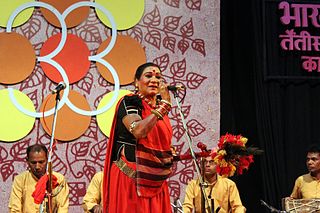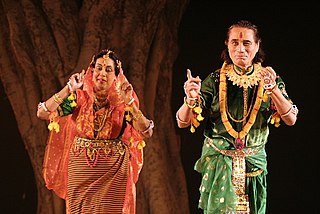
Jasraj was an Indian classical vocalist, belonging to the Mewati gharana. His musical career spanned 75 years resulting in national and international fame, respect and numerous major awards and accolades. His legacy includes memorable performances of classical and semi-classical vocal music, classical and devotional music, albums and film soundtracks, innovations in various genres including Haveli Sangeeth and popularizing the Mewati Gharana – a school of thought in Hindustani classical music. Pandit Jasraj taught music to amateur and professional students in India, Europe, Canada and the United States.

Bansi Kaul was an Indian theatre director and the founder of Rang Vidushak, a theatre group in Bhopal. He was a recipient of the Padma Shri, India's fourth highest civilian honor, in 2014, and the Sangeet Natak Akademi Award in 1995. Some of his notable plays included Aala Afsar, Kahan Kabir, and Sidhi Dar Sidhi urf Tukke pe Tukka. He was a designer and associate show director for the 2010 Commonwealth Games opening ceremony and also the art director for the 1986 and 1987 Khajuraho Festival.

Teejan Bai is an exponent of Pandavani, a traditional performing art form, from Chhattisgarh, in which she enacts tales from the Mahabharata, with musical accompaniments.

Pandit Bhajan Sopori was an Indian instrumentalist. He was a player of the santoor, an ancient stringed musical instrument.

Surinder Kaur was an Indian singer and songwriter. While she mainly sang Punjabi folk songs, where she is credited for pioneering and popularising the genre, Kaur also recorded songs as a playback singer for Hindi films between 1948 and 1952. For her contributions to Punjabi music, she earned the sobriquet Nightingale of Punjab, the Sangeet Natak Akademi Award in 1984, and the Padma Shri in 2006.

The Wadali Brothers – Puranchand Wadali and Pyarelal Wadali – are Sufi singers and musicians from Guru Ki Wadali in the Amritsar District in Punjab, India. Pyarelal Wadali, the younger of the two died on 4 March 2018 at the age of 75 due to cardiac arrest at the Fortis Escorts Heart Institute, Amritsar.

Dwaram Venkataswamy Naidu was an Indian violinist in the Carnatic classical tradition. Known for his refined bowing technique and expressive playing, Naidu was one of the most celebrated violinists of the 20th century in Carnatic music. He was the recipient of several prestigious awards, including the Sangeet Natak Akademi Award in 1953 and the Padma Shri in 1957. Despite being partially blind, Naidu achieved international recognition and influenced many students and musicians during his career. Several members of his family are also notable Carnatic violinists.

Rajkumar Singhajit Singh was a leading exponent, choreographer and a guru of Indian classical dance form of Manipuri, including the Pung cholom and Raslila. He was awarded the Sangeet Natak Akademi Award in 1984 and the Padma Shri in 1986 for his contribution to the Manipuri dance. In the year 2011, Sangeet Natak Akademi, India's The National Academy for Music, Dance and Drama, awarded him its highest award, the Sangeet Natak Akademi Fellowship for his contribution to Indian Dance. In 2014 he was also conferred with the Tagore Award.

Heisnam Kanhailal was an Indian art theatre personality. For his work, he was awarded the Padma Shri civilian award in 2004 and the Padma Bhushan civilian award in 2016 by the Government of India. He was the founder-director of Kalakshetra Manipur, a theatre laboratory established in 1969 that explores a new vocabulary in the existing language of theatre.

Ustad Abdul Rashid Khan was an Indian vocalist of Hindustani music. Apart from khayal, he performed dhrupad, dhamar and thumri. As of 2020, he is the oldest person to have been conferred a Padma award.
N. Rajam is an Indian violinist who performs Hindustani classical music. She remained professor of music at Banaras Hindu University, eventually became head of the department and the dean of the Faculty of Performing Arts of the university.

'Suramani' PanditRaghunath Panigrahi was an Odissi music Guru, vocalist, composer and music director. He is most known for his renditions of Jayadeva's Gita Govinda and his vocal support for his wife, the Odissi danseuse Sanjukta Panigrahi. Raghunath belonged to a family associated with Odissi music for centuries, members of which were 19th-century Odissi poet-composer Sadhaka Kabi Gourahari Parichha and Gayaka Siromani Apanna Panigrahi who was the royal musician (raja-sangitagya) of Paralakhemundi. He started his musical training from his father Pt Neelamani Panigrahi, who had been collecting traditional Odissi melodies of the Gita Govinda from the Jagannatha Temple of Puri. Later, Raghunath continued learning Odissi music under Pt Narasingha Nandasarma and Pt Biswanatha Das. He was widely known as 'Gitagobinda Panigrahi'.

Suresh Talwalkar is an Indian musician who plays the percussion instrument tabla.

Padma Sachdev was an Indian poet and novelist. She was the first modern woman poet of the Punjabi. She also wrote in Hindi. She published several poetry collections, including Meri Kavita Mere Geet, which won the Sahitya Akademi Award in 1971. She also received the Padma Shri, India's fourth highest civilian award in 2001, and the Kabir Samman for poetry for the year 2007-08 given by Government of Madhya Pradesh, Saraswati Samman for the year 2015, Sahitya Akademi Fellowship in 2019.

Shanno Khurana is an Indian classical vocalist and composer, from the Rampur-Sahaswan gharana of Hindustani classical music. A disciple of the doyen of the gharana, Ustad Mushtaq Hussain Khan, she is known for performing rare bandish and raag, though her singing style includes genres like khayal, tarana, thumri, dadra, tappa, to chaiti and bhajan. Born and brought up in Jodhpur, she started singing on All India Radio in 1945 in Lahore, later shifted to Delhi, where she continued her singing on All India Radio, Delhi and in concerts and music festivals. She also pursued music education, finally earning her M.Phil. and PhD in music from the Kairagarh University, and has undertakes extensive research on folk music of Rajasthan. She is currently 97 years old.

Balwant Thakur is an Indian theatre personality and scholar, known for bringing Dogri theatre to international notice. He was honoured by the Government of India, in 2013, by bestowing on him the Padma Shri, the fourth highest civilian award, for his contributions to the field of theatre.

Khumanthem Ningol Nameirakpam Ongbi Ibemni Devi was an Indian singer of traditional music, known for her expertise in the Khongjom Praba genre of Manipuri music. The Government of India honoured Ibemni Devi in 2012, with the fourth highest civilian award of Padma Shri.
Haobam Ongbi Ngangbi Devi was an Indian classical dancer and musician, known for her expertise in the Manipuri Dance forms of Lai Haraoba and Raas. In 2010, the Government of India awarded Haobam Ongbi Ngangbi Devi the Padma Shri, the fourth highest Indian civilian award.
Rita Ganguly is an exponent in the Indian classical arts. An accomplished dancer, musician and vocalist, she was honoured with the Sangeet Natak Akademi Award in 2000 and with the Padma Shri in 2003. She is the mother of actress Meghna Kothari and the younger sister of the famous Ravindra Sangeet singer Gita Ghatak.
Narsingh Dev Jamwal is an Indian writer and playwright from Jammu, who has authored 48 books, including Sanjhi Dharti Bakhle Mahnu (novel), which won the Sahitya Akademi Award in 1978. He received India's fourth highest civilian award, Padma Shri (2019) for his contribution in the field of literature and education.
















